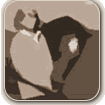Jennifer MacKenzie is an agricultural photo journalist with almost 30 year's experience. Operating from her base in Cumbria, Jennifer undertakes mainly industry-related freelance writing and photography.
Bowsden Moor Pedigree Livestock
Pedigree livestock are putting an arable farm in the Scottish Borders firmly
on the map.
Through successful embryo transfer work, in just over a decade at Bowsden
Moor near Berwick, Jonathan and Jayne Watson and Jonathan’s uncle
Brian Redhead (trading as Redhead and Watson) have established pedigree
British Blue and Limousin herds which are achieving creditable prices through
the sale ring, alongside pedigree Suffolk and Texel flocks.
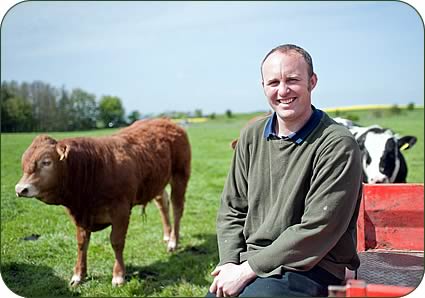 |
| Jonathan with young Limousin and British Blue bulls |
The partnership moved to the Borders in 1987 from West Cumbria and they
own 330 acres, with a further 220 acres neighbouring Bowsden Moor plus
200 acres of seasonal grazing. All the land is suitable for arable cropping,
but only 150 acres are put down to cereals in rotation with the grassland.
They employ one full time man, Thomas Robson.
“We had 300 crossbred cows but when the Single Farm Payment came
in it was hard to make it stack up financially so we sold the commercial
cows to concentrate on our herd of pedigree Limousins,” said Jonathan.
“Another issue we had was with the health status of the cattle, so
we expanded the numbers of Limousins and also started a herd of British
Blues, both under the Tweeddale prefix,” he added.
It was a visit to the Carlisle Limousin Red Ladies sale in 1999 that set
off the herd and subsequent purchases from Denis Lomas (Glebedale), Robert
Graham’s (Grahams) and Roy Fisher (Castlewigg) herds established
good foundation cow families that have been expanded through ET work.
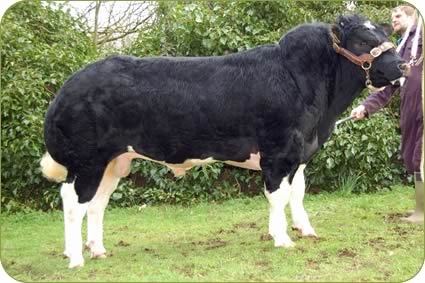 |
| Tweeddale Ebony |
Females have been selected for their size and bone to produce progeny
of good weight gain potential along with superior carcase quality with
selection also focusing on temperament.
The star of the Glebedale purchases was Iloris, a daughter of the famous
cow Silorie, who bred three supreme champions at Carlisle Limousin sales.
Two Grahams cows have been consistent breeders with Grahams Sharon producing
two bulls which sold for 10,000gns and 8.500gns. The herd’s most
recent purchase was in February 2008, Newstart Abeille, whose son produced
by the most recent stock bull Newhouse Cyclone sold to Cogent at 10 months
old.
Limousin herd now numbers 70 cattle and is closed. The herd’s first
stock bull was Sympa son, Haltcliffe Argos whose first four sons sold averaged £6,000
with a top of 8,500gns at the Carlisle February 2011 sale.
Embryo work carried out by Celltech, Cheshire, produced between 60 and
70 Limousin and British Blue calves a year.
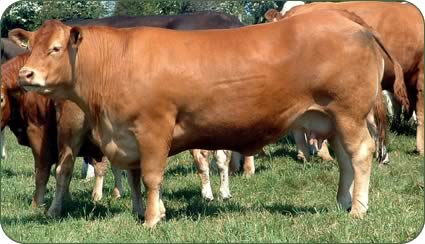 |
| Grahams Sharon |
As commercial producers recognising the strength and qualities of the Limousin
meant it was a natural step to establish a pedigree herd.
A Blue bull had also been used commercially and again the breed was the
logical choice when starting another pedigree beef herd.
The first purchase was Clarebrand Bertha whose sons sold to a top price
of 5,800gns with others at 5,000gns and 4,000gns.
Two females were bought at Carlisle from David Leggat’s Broomfield
herd. Nanette had a bull calf at foot and she was flushed. Two embryo bull
calves at the Carlisle May 2010 show and sale sold for 6,000gns each, one
of which was the reserve champion.
Five bulls averaged £5,000 while six yearling heifers made an average £3,000
a head.
More recent additions to the herd have been three cows and four heifers
purchased from Belgium. One of the first bull calves from the imports Tweeddale
Fearless has been sold to Cogent. The first five bulls and 11 heifers from
these females went through the ring at Borderway on May 21.
The herd now numbers 20 cows, half of which are bred naturally with the
remainder flushed for embryos.
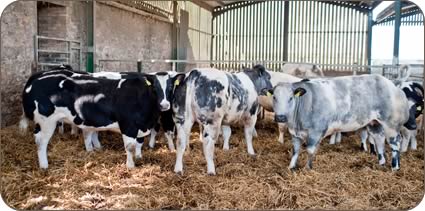 |
| British Blue heifers |
At Borderway Agri-Expo 2010 the Border British Blue Club award for the
best opposite sex to the champion went to Tweeddale Emise at 10 months
old, a daughter of one of the imported females which sold privately at
the show.
Another ET daughter, Tweeddale Flare was junior female champion at the
Stars of the Future inaugural Scottish pedigree calf show for Blues at
Forfar.
Royal Highland Show 2010 was the Watsons’ first major show outing
with British Blues. Ebony did exceptionally well in the males and Tweeddale
Enhance did equally well in the females. Enhance was a 15 month old heifer
and achieved junior champion. The first calves off her are due in late
May through embryo transfer.
Also Tweeddale Ebony achieved senior champion. Ebony also achieved reserve
junior champion and reserve male champion at Royal Highland Show 2010 and
best young bull in the Borders BB herd competition and is now in stud at
Cogent.
Both herds are performance recorded and are in the SAC health scheme.
The pedigree Suffolk flock goes back the furthest to 1984 and carries the
Brijon prefix. Since the establishment of the pedigree Texel flock in 2000,
Suffolk numbers have been scaled back from 150 to 70 ewes. Both flocks
are MV accredited and closed.
Between 25 and 30 shearling rams from each breed are sold at the annual
Kelso Ram Sale. The 70-ewe Texel flock also carries the Brijon prefix.
Rams have sold to a top price of £7,000 for the Texels to average
between £600 and £800. The Suffolk best price is £3,600
with a similar average. The sheep are run on a commercial basis to allow
more emphasis to be placed on the cattle enterprise.
A flock of 500 Lleyn ewes is also run to enable all the sheep to be MV
accredited and flock replacements to be home bred. They are bred pure as
well as being crossed with the Suffolk. Some of of the females are kept
and crossed with the Texel.
The Suffolks lamb at the end of January with the Texels and Lleyns following
from the end of March-beginning of April.
